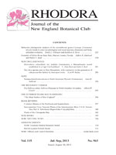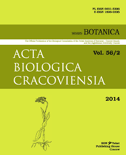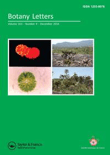
Annali di Botanica
Scope & Guideline
Exploring the depths of plant sciences with open access.
Introduction
Aims and Scopes
- Plant Ecology and Biodiversity:
Research on the diversity of plant species, their ecological interactions, and the impacts of environmental factors on plant communities. - Conservation and Management:
Studies aimed at assessing the conservation status of plant species and ecosystems, including the management of invasive species and the effects of human activities. - Agricultural and Horticultural Practices:
Investigations into the effects of various agricultural practices on plant growth, yield, and quality, including the use of fertilizers, herbicides, and biostimulants. - Physiological Plant Responses:
Research exploring how plants respond at a physiological level to environmental stresses, such as drought, salinity, and pollution. - Cultural and Economic Aspects of Plants:
Studies that examine the role of plants in cultural practices and their economic significance, including traditional uses and modern applications.
Trending and Emerging
- Impact of Climate Change on Plant Systems:
An increasing number of studies are addressing how climate change affects plant physiology, biodiversity, and ecosystem services, highlighting the urgency of understanding these impacts. - Bioremediation and Pollution Management:
Research on the use of plants for bioremediation of contaminated environments is gaining traction, reflecting a broader interest in sustainable environmental management. - Ecological Restoration and Conservation Strategies:
There is a growing emphasis on restoration ecology, with studies focusing on strategies to restore degraded ecosystems and conserve biodiversity. - Plant-Microbe Interactions:
Emerging research on the interactions between plants and microbes, including their roles in plant health and resilience under stress conditions. - Utilization of Native and Invasive Species:
Increasing attention is being paid to both native and invasive species for their ecological roles and potential uses in agriculture and horticulture.
Declining or Waning
- Traditional Medicinal Plants:
Research on the use and conservation of traditional medicinal plants has decreased, possibly due to a shift towards more empirical studies and modern agricultural practices. - Classical Taxonomy:
Studies focused solely on classical taxonomic work are less frequent, indicating a movement towards integrative approaches that combine molecular techniques with traditional methods. - In-depth Studies on Local Flora:
While local flora studies are still relevant, there is a noticeable decline in papers solely focused on local species without broader ecological or conservation implications.
Similar Journals

Botanical Sciences
Fostering innovation and discovery in botanical research.Botanical Sciences, published by SOC BOTANICA MEXICO, is a pioneering open access journal dedicated to advancing the field of plant science. Established in 2012, it has rapidly become an essential resource for researchers and professionals interested in the diverse aspects of botany, including plant biology, ecology, and conservation. With an ISSN of 2007-4298 and an E-ISSN of 2007-4476, the journal operates under a vision to foster the exchange of knowledge and innovations among scientists globally. Recognized in the Q3 quartile for plant science in 2023 and ranking at #304 out of 516 in the Scopus category for Agricultural and Biological Sciences, Botanical Sciences is strategically positioned to widen its reach and impact. The journal's commitment to open access ensures that research findings are freely available to an international audience, providing invaluable insights and fostering collaboration within the botanical sciences community. The editorial board comprises leading experts who are dedicated to maintaining high-quality peer review processes to uphold the standards expected by the academic community.

Tropical Plant Biology
Advancing Knowledge in Tropical EcosystemsTropical Plant Biology is a premier academic journal published by Springer, dedicated to advancing the understanding of tropical plants and their ecological significance. With an ISSN of 1935-9756 and an E-ISSN of 1935-9764, this journal serves as a vital platform for researchers, professionals, and students focused on the fields of Genetics and Plant Science. Notably recognized in 2023 as a Q2 journal in Plant Science and Q3 in Genetics, it ranks 171st out of 516 in Agricultural and Biological Sciences and 227th out of 347 in Genetics according to Scopus. The journal encompasses a diverse range of topics, offering insights into tropical plant biology, ecology, conservation, and biodiversity. Although it does not currently operate under an open-access model, it remains an essential resource for anyone passionate about tropical ecosystems and their intricate relationships. With contributions spanning from 2009 to 2024, Tropical Plant Biology continues to foster scholarly discourse and innovation in the field.

RHODORA
Nurturing Insights in Botanical StudiesRHODORA, published by the New England Botanical Club Inc, is a prominent journal dedicated to the field of botany, specifically focusing on Horticulture and Plant Science. With a rich history dating back to its founding years and ongoing publication from 1995 to 2024, this journal serves as a vital platform for disseminating research, reviews, and advancements in botanical studies. Though classified in the Q4 quartile for both horticulture and plant science in 2023, RHODORA remains an essential resource for researchers and practitioners, providing insights into plant ecology, conservation, and cultivation practices. While it does not offer Open Access options, the journal's commitment to quality research in a highly specialized field makes it a significant contributor to the botanical sciences, fostering collaboration and innovation among scholars and professionals in the United States and beyond.

Hacquetia
Fostering Innovation Through Open Access ResearchHacquetia is an esteemed open-access journal dedicated to the interdisciplinary exploration of ecology, evolution, behavior, systematics, forestry, and plant science. Published by SCIENTO since 2007, this journal has established itself as a pivotal platform for researchers and academics looking to disseminate their findings in these critical fields. Nestled in the heart of Warsaw, Poland, Hacquetia offers unrestricted access to its content, promoting knowledge sharing among professionals, students, and enthusiasts alike. The journal, while ranked in the Q4 category across its relevant disciplines in 2023, serves as a valuable resource for those seeking to contribute to and engage with contemporary ecological and botanical research. Its commitment to open access ensures that cutting-edge research is available to a global audience, fostering innovation and collaboration in the scientific community.

Boletin de la Sociedad Argentina de Botanica
Connecting researchers through the lens of Latin American botany.Boletin de la Sociedad Argentina de Botanica is a prestigious open-access journal dedicated to advancing the field of botany, with a specific focus on plant science and ecological study. Published by the SOC ARGENTINA BOTANICA since 2005 and based in Argentina, this journal is committed to providing a platform for high-quality research that contributes to the understanding of plant biology, evolution, and ecological interactions. With an ISSN of 1851-2372, it features research articles that are accessible to a global audience, thus promoting collaboration and knowledge sharing among scientists, researchers, students, and the broader academic community. Despite being categorized in the fourth quartile for both Ecology, Evolution, Behavior and Systematics and Plant Science as of 2023, the journal serves as an important resource within its niche, offering insights from the Latin American context. Researchers and professionals are encouraged to utilize this journal as a valuable reference in their studies and contributions to the ongoing discourse in botanical science.

ACTA BIOLOGICA CRACOVIENSIA SERIES BOTANICA
Advancing plant science through rigorous research.ACTA BIOLOGICA CRACOVIENSIA SERIES BOTANICA is a distinguished journal published by the Polska Akademia Nauk (Polish Academy of Sciences), with its roots tracing back to 1996. As a pivotal publication in the field of Plant Science, it serves to disseminate high-quality research and findings, contributing to the ongoing development and understanding of biodiversity, plant ecology, and conservation. The journal is indexed under Scopus, ranked #203 out of 516 in its category, placing it in the 60th percentile and firmly within Q3 quartile for Plant Science in 2023. Researchers, professionals, and students will find invaluable content within its pages, enhancing their knowledge and supporting academic exploration. Although it currently does not offer open access options, the journal remains a crucial resource for those engaged in botanical sciences, with a commitment to advancing scholarship in Poland and beyond.

Plants People Planet
Empowering Research for Ecological and Human Well-being.Plants People Planet is a leading academic journal published by Wiley, focusing on the intricate relationships between plants, people, and the planet. Since its debut as an Open Access publication in 2019, it has quickly established a significant presence in the scholarly community, achieving impressive rankings in multiple categories. Notably, it holds a prestigious Q1 ranking in Ecology, Evolution, Behavior and Systematics, Forestry, Horticulture, and Plant Science as of 2023. With its dedicated scope addressing crucial ecological and horticultural advancements, this journal is essential for researchers, professionals, and students who aim to explore interdisciplinary approaches to sustainable plant management and environmental stewardship. Operating from the United Kingdom, it serves a global audience of scholars, providing an invaluable platform for disseminating innovative research and fostering collaborative dialogue in these pivotal fields. For those interested in cutting-edge research that bridges the gap between human practices and ecological health, Plants People Planet is a must-publish venue.

Botany Letters
Fostering Global Collaboration in Plant ResearchBotany Letters, published by Taylor & Francis Ltd, is a prominent journal in the field of Plant Science based in the United Kingdom. With its ISSN 2381-8107 and E-ISSN 2381-8115, the journal has established itself as an essential resource for researchers, professionals, and students alike, focusing on innovative studies and findings in botany. As a Q2 ranked journal in its category (2023) and holding a respectable Scopus rank of #200 out of 516 in Agricultural and Biological Sciences, it reflects a robust commitment to quality and relevance in the field. The journal's open access model ensures that groundbreaking research is readily accessible, fostering collaboration and knowledge sharing among the global scientific community. Covering a broad spectrum of topics within plant science from 2016, Botany Letters aims to catalyze advancements in the understanding and management of plant biodiversity and sustainability, ultimately contributing to conservation efforts and agricultural innovation.

BANGLADESH JOURNAL OF BOTANY
Connecting Ecology and Conservation in BotanyBANGLADESH JOURNAL OF BOTANY is a prominent publication in the field of plant sciences, dedicated to advancing research and knowledge within the botanical community. Published by the BANGLADESH BOTANICAL SOC, this journal serves as a vital platform for researchers and scholars seeking to disseminate their findings related to plant biology, ecology, and conservation practices, particularly within the unique context of Bangladesh's diverse flora. With an ISSN of 0253-5416 and an E-ISSN of 2079-9926, the journal encompasses a wide scope of topics, reflecting interdisciplinary approaches in botanical research. Since its inception, with convergence periods from 1996 to 2001 and from 2003 to 2024, it has garnered recognition, positioned in the Q4 category in the Plant Science field with a ranking of #459/516 in Scopus, indicating its contribution to the field despite its developing impact. Operating within Bangladesh, at the UNIV DACCA DEPT BOTANY, the journal provides a crucial insight into the ecological and agricultural implications of plant studies in the region, catering to the needs of academics, professionals, and students eager to engage with contemporary botanical research.

ACTA SOCIETATIS BOTANICORUM POLONIAE
Innovating the Future of Plant Ecology and ConservationACTA SOCIETATIS BOTANICORUM POLONIAE is a reputable open-access journal dedicated to the field of Plant Science, published by the Polskie Towarzystwo Botaniczne since 1923. With an ISSN of 0001-6977 and an E-ISSN of 2083-9480, this journal has made significant contributions to the botanical sciences, fostering the dissemination of research from Poland and beyond. The journal has ranked in the third quartile (Q3) within its category in the 2023 journal metrics, demonstrating a strong presence in the global academic community, as evidenced by its Scopus ranking of 291/516 within the Agricultural and Biological Sciences sector, placing it in the 43rd percentile. While specific H-Index data are currently not available, ACTA continues to attract submissions from a broad international audience and publishes a wide range of studies that advance the understanding of plant biology, ecology, and conservation. The journal remains a vital resource for researchers, professionals, and students alike, committed to enhancing knowledge and collaboration in botanical science.